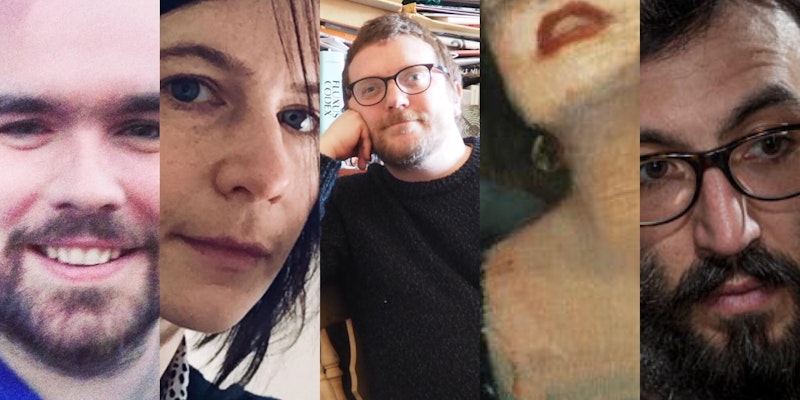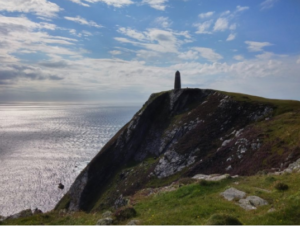I will be presenting a roundtable panel of Latvian poets writing in the endangered language Livonian, Valt Ernštreit, Baiba Damberg, Ķempi Kārl, at the 2018 AABS Conference at Stanford University.
The Livonians are the southernmost Finnic nation and are indigenous to Latvia. In the beginning of the Middle Ages, Livonian was spoken across vast territories of present-day Latvia around the Gulf of Rīga and including the area of Latvia’s capital – Rīga. The Livonians have contributed greatly to the historical development of the Central Baltic region and the shaping of modern Latvian language and culture.
Presently, Livonian is critically endangered and is now spoken by just some twenty people. However, several authors actively writing in Livonian can be found among them. The tradition of writing literature in Livonian has existed for almost 200 years with the first poems in Livonian being written in the mid-19th century. The Livonian poets – Valt Ernštreit, Baiba Damberg, Ķempi Kārl – are continuing this tradition today.
In spring 2018, the bilingual anthology Trillium will be published in English and Livonian featuring the work of these three poets and celebrating the centennial of Latvia’s independence as well as its guest nation status at the London Book Fair. Trillium was edited by Livonian linguist and poet Valts Ernštreits, translated by poet Ryan Van Winkle and linguist Uldis Balodis, with its design created by well-known Latvian book artist Zane Ernštreite.
The round table will introduce its participants to Livonian history from ancient to modern times as well as present Trillium along with readings of poems in both Livonian and English by its authors and translators. This will also be an opportunity to discuss new perspectives for Livonian language and literature.
Short Bio
Valts Ernštreits
Livonian linguist and culture worker. Ernštreits defended his PhD on the Livonian literary language and is currently involved in the writing of the first ever Livonian reference grammar at the University of Tartu. He is the head of Līvõ kultūr sidām (Livonian Culture Centre, 1994) dedicated to the safeguarding, study, and development of Livonian language and culture. He is also chief editor of the Livonian history, language, and culture portal Livones.net. A poet writing in Livonian and Latvian, translator, and visual artist, Ernštreits has received Norwegian, Estonian, Finnish, and Latvian state decorations.Karl Pajusalu
Professor of Estonian dialectology and the history of the Estonian language at the University of Tartu, member of the Estonian Academy of Sciences, and foreign member of the Latvian Academy of Sciences. He has studied the historical formation of the Southern Finnic languages, incl. Salaca Livonian, and Estonian and Livonian dialect contacts. He created an orthography for Salaca Livonian, which he has used in his Salaca Livonian poetry volumes.Uldis Balodis
Latvian linguist and translator. Balodis works with the Finnic languages of Latvia and the Native languages of North America. He has had a personal and professional interest in Livonian for over 20 years. Since 2013, he has studied the historically South Estonian-speaking Lutsi people of Latgale (eastern Latvia). He is currently writing a Lutsi language primer and a volume supported by the AABS Baumanis Grant on the historical Lutsi villages and their inhabitants. Balodis published his dissertation, a reference grammar of the Northern California Yuki language, in 2016.Gunta Kļava
Latvian linguist, Latvian Language Agency, University of Latvia. Her research interests include sociolinguistics, language policy, and language contacts. She is an author and editor of research into language policy in Latvia. Her responsibilities at the Latvian Language Agency also include support for Livonian language development projects and activities.

 On Wednesday 23 May, 7pm, I will be reading at the Scottish Poetry Library with Latvian poets
On Wednesday 23 May, 7pm, I will be reading at the Scottish Poetry Library with Latvian poets  On Thursday 24 May, 7.30pm, I will be joined at the Edinburgh Food Studio by Latvian poets
On Thursday 24 May, 7.30pm, I will be joined at the Edinburgh Food Studio by Latvian poets  There will be screenings of The Good Dark, made by Lucas Chih-Peng Kao, in Edinburgh and Stirling over the next fortnight. First in Edinburgh at the
There will be screenings of The Good Dark, made by Lucas Chih-Peng Kao, in Edinburgh and Stirling over the next fortnight. First in Edinburgh at the  I’ll be reading alongside Richard Scott, Tessa Berring, Sarah Bernstein and Andy Spragg at the
I’ll be reading alongside Richard Scott, Tessa Berring, Sarah Bernstein and Andy Spragg at the  I’m very grateful to have been selected for this year’s
I’m very grateful to have been selected for this year’s 
 I’ll be reading this Thursday 16 November, 6.30pm at
I’ll be reading this Thursday 16 November, 6.30pm at 



 Photo by Rich Dyson
Photo by Rich Dyson